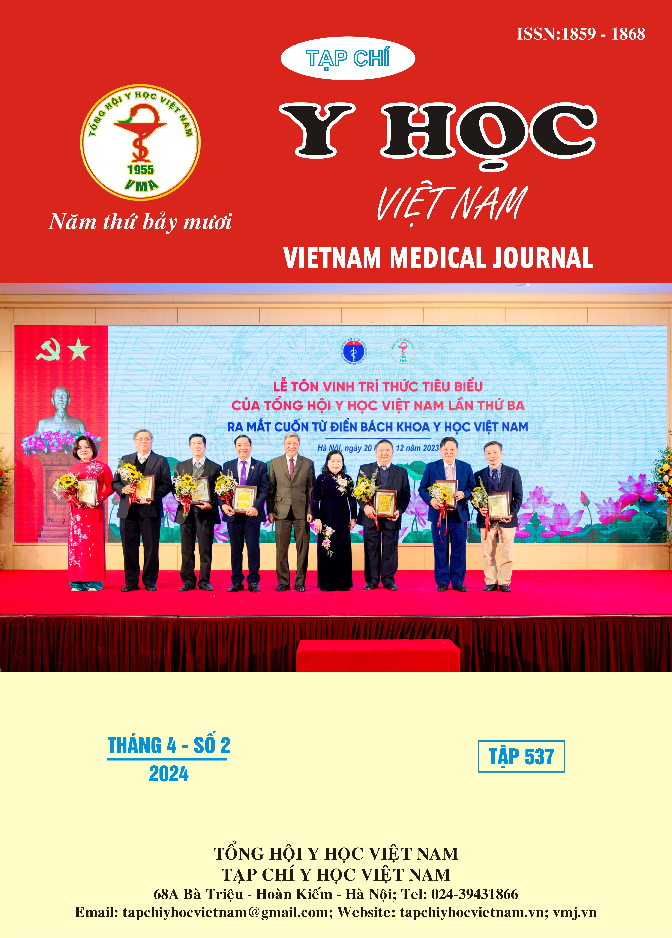THE STUDY OF THE UNDERSTANDING ABOUT POSTPARTUM DEPRESSION FOR PREGNANT WOMEN AT PHU SAN HA NOI HOSPITAL
Main Article Content
Abstract
Aims: We research the understading of pregnant women about emotions and external factors affecting the risk of postpartum depression at their pregnancy visits at Phu San Hanoi Hospital, as well as fiding down the other factors related to their understading of the post partum depression. Methods: The study describes a cross-sectional survey conducted over a period of time or a short period of time, where each subject only collects information once, rather than tracking time, then infer the causal relationship between variables to determine the predictive factors and outcomes, in order to determine the understanding of postpartum depression among pregnant women that examine at Phu San Hanoi Hospital in 2021. Results: The understanding of regnant women about emotions at post partum period, especially the signs "Feeling paniced, unresonalbe fear" and "feeling empty" was aggreed by absolutely 100% pegnant woment. The external factors affecting postpartum women such as “lacking of sleep regularly” considered at the agreement rate of 99.2%. Attendees realized that sleep for pregnant and postpartum women is very important. This is one of the determining factors in subsequent behaviors such as “often feeling tired” and “being irritable”. The factors related to family relationship such as “lacking of support from family”, “worrying about their husbands” also have hight rates of 94.0% and 88.9% respectively. Conclusion: The understanding of postpartum depression among pregnant women was agreed uopn by research subjects with a high rate, in which the expressions “Felling fear, scared for no reason” and “ Felling emlty” were at a high rate (100% agree). Postpartum depression affects a woman's ability to care for herself and her baby. Women may not bond with their children, resulting in emotional, social and cognitive problems later in life. Age at the time of pregnancy (the younger the age, the higher the rate of depression), with the age group from 18 to 29 years old accounting for the highest rate at 64.4%. Lack of sleep and overload due to staying up all night to take care of children for long days; Worry and doubt about one's own ability to raise children accounted for 99.2% of agreement from research subjects.
Article Details
Keywords
: postpartum stress, postpartum depression, causes of postpartum depression, consequences of postpartum depression, the pregnant women going for examination.
References
2. https://benhlytramcam.vn/tram-cam-sau-sinh-562/
3. https://www.postpartumdepression.org/resources/statistics/
4. https://womensmentalhealth.org/specialty-clinics/postpartum-psychiatricdisorders/ MGH centre for women’s mental health
5. https://flo.health/being-amom/recovering-from-birth/emotions-after-delivery/postpartum-psychosis
6. Second-rate Goddess: My hilarious journey through posdparttum despression (Emily Andrew)
7. The pregnancy & postpartum anxiety workbook (Pamela S.Wiegartz, Phd & Kevin L.Gyoerkoe, Phd)
8. Pregnancy Blues: What every woman needs to know about despression during pregnancy (Shaila Kulkarni Misri, MD, F.R.C.P.C.)
9. Research Article: Postpartum Depression and Risk Factors among Vietnamese Women.
10. Nghiên cứu nhận thức của phụ nữ về TCSS (Nghiên cứu trên địa bản thành phố Đà Nẵng).


